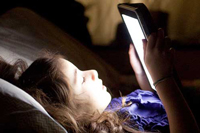redo Jump to...
print Print...
Note: This article is from the British newspaper The Daily Telegraph. (by Stephen Adams, London’s Daily Telegraph) – Using tablet computers like Apple’s iPad and Samsung’s Galaxy Note just before bed can lead to a poor night’s sleep, according to research.
(by Stephen Adams, London’s Daily Telegraph) – Using tablet computers like Apple’s iPad and Samsung’s Galaxy Note just before bed can lead to a poor night’s sleep, according to research.
More and more people are [using] their tablets…to surf the web, check Facebook or email before switching off the light [to go to sleep]. But researchers are warning that the blueish light their screens emit can stop users getting a good night’s sleep. That is because this type of light mimics daylight, convincing the brain that it is still daytime. …
Any light can make it tough to fall asleep…, but light of shorter wavelengths, such as the bluish tints emitted from an LED-backlit screen, suppresses nocturnal melatonin, according to the sleep study. The brighter the light and longer the exposure, the more difficulty it will cause in falling asleep.]
By contrast, light which is more orange or red in tone does not suppress melatonin production, perhaps because our brains recognize it as a cue that the day is ending.
Neurologists have known for years that staring at screens late in the evening can disrupt sleep – be they television screens, computer screens or mobile phone screens.
However, because cell phones and tablets are by nature portable… more people are taking them into the bedroom.
Users also tend to hold them much closer to their eyes than a computer or television screen.
Researchers at the Lighting Research Center, at the Rensselaer Polytechnic Institute in New York, are warning that looking at tablet displays for more than two hours “leads to a suppression of our natural melatonin levels as the devices emit optical radiation at short wavelengths” – in other words, they emit bluer light.
They say: “Although turning off devices at night is the ultimate solution, it is recommended that if these devices are used at night displays are dimmed as much as possible and that the time spent on them before bed should be limited.”
They drew their conclusions after measuring melatonin levels in 13 volunteers, after they had spent time viewing iPads at full brightness at a distance of 10 inches, for two hours.
Melatonin levels were significantly lower after they had done this, than they were after the volunteers had viewed their iPads for the same time, but while wearing orange glass goggles, which cut out the blue light.
They wrote in the journal Applied Ergonomics that tablet makers could “tune the spectral power distribution of self-luminous devices” so that they disrupted the sleep patterns of users less.
It is not just a good night’s sleep that could be jeopardized by too much late night screen time.
Researchers know that persistent disruption to sleep patterns can lead to an increased risk of obesity, and even breast cancer.
However, these studies tend to be comparisons of those with chronic sleep disruption, such as long term shift workers, with those who have normal sleep patterns.
Information appearing on telegraph.co.uk is the copyright of Telegraph Media Group Limited and must not be reproduced in any medium without license. Reprinted here for educational purposes only. May not be reproduced on other websites without permission from the Telegraph. Visit the website at telegraph. co. uk. (This article was first published at the Telegraph on Sept. 10)
Questions
1. What is the negative effect of using iPads or other tablet devices just before going to bed, according to research done at Rensselaer Polytechnic Institute’s Lighting Research Center?
2. Why do these portable devices have this effect on sleep? Be specific.
3. What recommendations do the Lighting Center’s researchers make for avoiding the negative effects of tablet use?
4. What have neurologists known for years would cause a disrupted night’s sleep?
5. a) Define validity.
b) What do you think of the validity of this study? Explain your answer.
6. If you were a person who didn’t sleep well, would you try limiting your use of tablet devices at bedtime? Why or why not?
CHALLENGE QUESTION: Conduct your own study. If you don’t use a tablet or smart phone at night, ask a parent, relative or friend who does. Ask the user to try eliminating the use of tablet devices before bedtime for a few days, and to see if this improves his/her sleep.
Daily “Answers” emails are provided for Daily News Articles, Tuesday’s World Events and Friday’s News Quiz.



